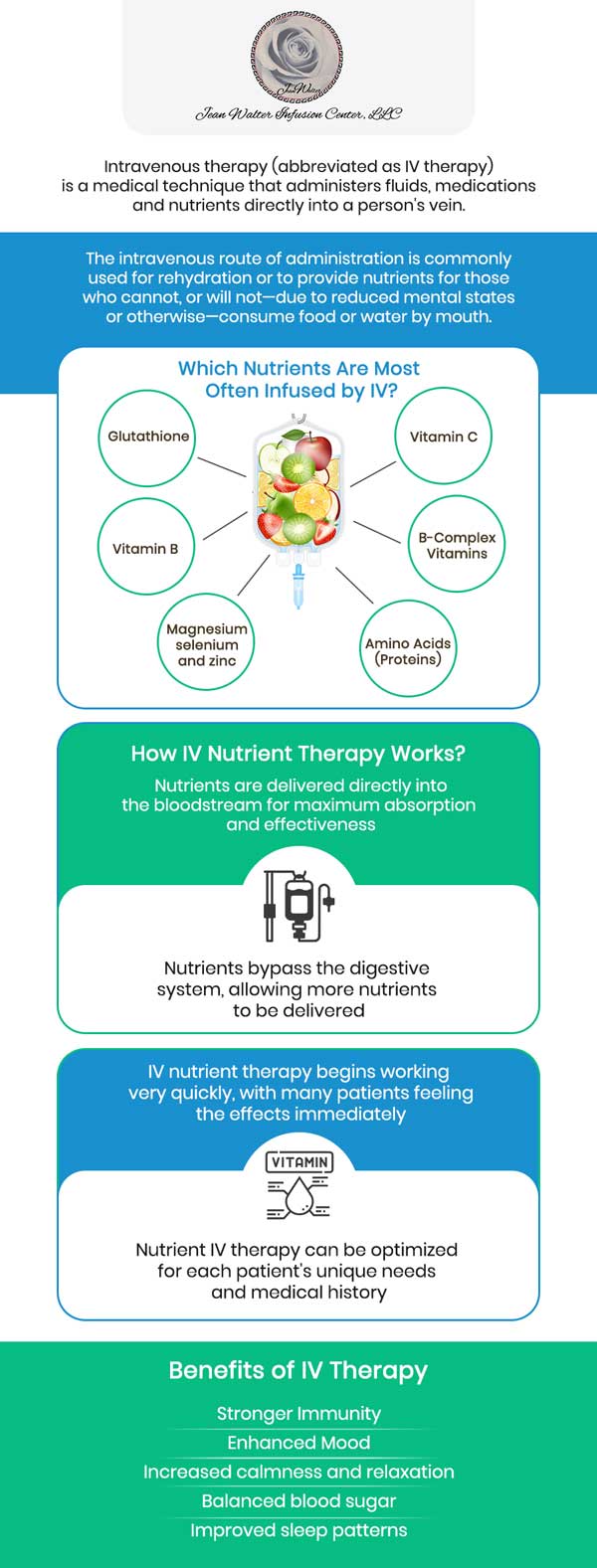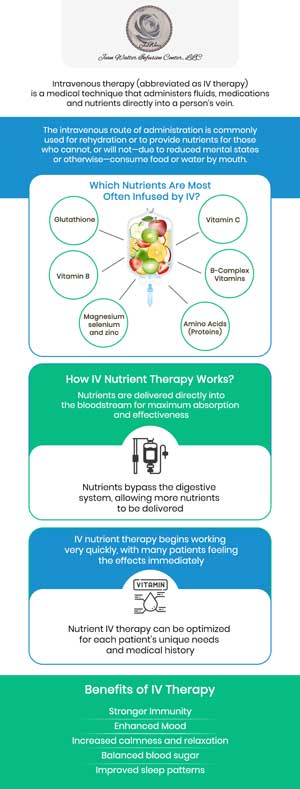The Importance of Infusion Therapy in Managing Chronic Conditions
Infusion therapy provides a comprehensive solution for patients with chronic conditions. This therapy enhances their ability to manage symptoms, maintain organ function, and improve their overall quality of life. By delivering medications directly into the bloodstream, we help patients focus on living rather than just coping with their conditions. Visit Dr. Nasseri, MD, to learn more about how our infusion therapy can transform your long-term healthcare strategy. For more information, contact us or book an appointment online. We have convenient locations to serve you in Edgewater, Rosedale, Columbia, Glen Burnie, North Baltimore, and Catonsville MD.


Table of Contents:
Which chronic conditions benefit most from infusion therapy?
How does infusion therapy improve the quality of life for chronic condition patients?
Is infusion therapy a long-term solution for managing chronic conditions?
How does infusion therapy help in managing autoimmune disorders?
How Can Infusion Therapy Help Manage Chronic Conditions at Jean Walter Infusion Center with Dr. Nasser Nasseri, MD?
Infusion therapy delivers medication or nutrients directly into the bloodstream, offering a more efficient and effective alternative to oral treatments.
Autoimmune Disorders
We specialize in targeted infusion therapies, including biologic agents and immunosuppressants, for conditions such as:
• Rheumatoid Arthritis: Reducing inflammation and slowing disease progression to enhance joint function.
• Multiple Sclerosis (MS): Administering monoclonal antibodies to decrease relapse frequency and severity.
• Crohn’s Disease and Ulcerative Colitis: Alleviating symptoms and promoting remission through reduced gastrointestinal inflammation.
Infectious Diseases
For severe infections, intravenous antibiotics and antifungals ensure rapid and effective treatment for conditions like sepsis, osteomyelitis, endocarditis, and pneumonia.
Cancer
We support cancer patients with chemotherapy and targeted infusion therapies for conditions like leukemia, lymphoma, and solid tumors, focusing on precise delivery to maximize effectiveness and minimize side effects.
Neurological Disorders
Infusion treatments for neurological conditions, such as MS and Parkinson’s disease, ensure precise dosage control to manage symptoms effectively.
Genetic Disorders
Infusion therapies help manage conditions like hemophilia and cystic fibrosis by maintaining essential protein or enzyme levels.
Nutritional Deficiencies
Patients with malabsorption disorders or critical illnesses receive infusion therapy to replenish vital nutrients and support recovery.
Chronic Dehydration
Intravenous fluids and electrolytes restore balance for patients with chronic dehydration, promoting overall well-being.
Chronic conditions often disrupt daily routines and impair overall well-being. At Jean Walter Infusion Center, we offer specialized infusion therapy that serves as a lifeline for these patients, significantly enhancing their quality of life by delivering medications, nutrients, or other fluids directly into the bloodstream. This method ensures fast and effective treatment, particularly for individuals who might not respond well to oral medications.
Alleviating Symptoms and Pain:
Our infusion therapy services provide immediate and sustained relief from symptoms by bypassing the digestive system, allowing for a faster onset of action. This efficient route is crucial for patients in acute distress or those requiring rapid intervention to prevent the progression of their condition. For example, our infusions of biologics and immunosuppressants can reduce inflammation, easing pain and improving mobility in patients with conditions like rheumatoid arthritis and multiple sclerosis.
Supporting Vital Organ Function:
Infusion therapy is crucial in maintaining organ function in chronic conditions. Patients with kidney disease may receive infusions of dialysis solutions to remove waste products and toxins from their blood. Similarly, patients with heart failure may benefit from infusions of vasodilators to enhance blood flow and reduce the workload on their hearts.
Enhancing Energy Levels and Mood:
Chronic conditions can lead to fatigue and low energy levels. Our infusion therapy can replenish essential nutrients, vitamins, and electrolytes that may be depleted due to the disease process or medications. This can significantly boost energy, improve mood, and enhance overall well-being, allowing patients to engage more fully in daily activities.
Reducing Hospitalizations and Improving Self-Management:
By reducing the frequency and severity of flare-ups or acute episodes, infusion therapy minimizes hospitalizations, enabling patients to maintain stable health and lead fuller, more active lives. Regular infusions empower patients to manage their conditions better and prevent complications, promoting a sense of control and involvement in their healthcare management.
Personalized Treatment and Comfort:
Infusion therapy is personalized to meet each patient’s needs, with carefully determined medications and dosages. Often administered in our comfortable outpatient setting, this approach enhances patient comfort and convenience, reducing the emotional and physical toll of frequent hospital visits. Our professionals guide that our private infusion suites allow patients to relax and rest while receiving treatment.
Infusion therapy, a critical treatment for managing chronic conditions, involves administering medications or fluids directly into the bloodstream for rapid absorption and effectiveness. The Jean Walter Infusion Center offers expertise in infusion therapy, providing tailored treatment plans and comprehensive care for conditions such as inflammatory bowel diseases, autoimmune disorders, cancer, and chronic infections.
Long-Term Benefits:
• Targeted and Efficient: Infusion therapy ensures optimal absorption, bypassing digestive challenges associated with oral medications.
• Sustained Relief: Our formulations are designed for slow release, providing prolonged therapeutic effects and enhancing patient adherence.
• Convenience and Comfort: Our center is designed to ensure a comfortable environment for patients who may require frequent visits due to the nature of their treatment.
• Cost and Accessibility: We work with patients and insurance providers to make infusion therapy as accessible and affordable as possible.
• Safety and Monitoring: With a focus on safety, our team closely monitors each patient’s response to therapy, adjusting treatment plans as needed to maintain effectiveness and minimize side effects.
Autoimmune disorders, where the immune system mistakenly targets the body’s own healthy tissues, require specialized interventions to modulate immune responses. At the Jean Walter Infusion Center, we offer infusion therapy as a vital treatment option, delivering medications directly into the bloodstream for precise and effective management of these conditions.
Mechanism of Action
Our infusion therapy utilizes biologics and immunosuppressants, designed to specifically modulate the immune system. Biologics, such as antibodies or fusion proteins, target molecules central to the disease process—like cytokines or inflammatory cells—while immunosuppressants broadly reduce immune activity to protect healthy tissues.
We provide infusion therapy for various autoimmune disorders, including:
• Rheumatoid Arthritis: Administering biologics like TNF-alpha and IL-6 inhibitors reduces joint inflammation and pain.
• Lupus: Our targeted therapies help control immune overactivity and reduce flare-ups.
• Inflammatory Bowel Disease (IBD): Immunosuppressants such as corticosteroids and azathioprine are used to manage intestinal inflammation.
• Multiple Sclerosis: We utilize biologics targeting specific immune cells to prevent nerve damage and slow disease progression.
• Vasculitis: Our immunosuppressants alleviate blood vessel inflammation, improving circulation and reducing discomfort.
Infusion therapy is a powerful treatment option for managing chronic conditions, and Dr. Nasser Nasseri, MD at Jean Walter Infusion Center provides specialized care to help patients improve their long-term health and quality of life. Chronic conditions like autoimmune diseases, inflammatory disorders, and other ongoing health issues can cause significant pain and discomfort. Infusion therapy, which includes treatments such as IVIG (Intravenous Immunoglobulin) and biologic infusions, delivers medications directly into the bloodstream, allowing for rapid and efficient absorption. This targeted approach helps reduce inflammation, regulate immune responses, and prevent flare-ups, providing effective relief under Dr. Nasseri’s expert care.
At Jean Walter Infusion Center, Dr. Nasseri tailors each infusion treatment to meet the unique needs of the patient, ensuring personalized care that addresses specific health challenges. Regular monitoring and adjustments to the treatment plan ensure that each patient receives the most effective therapy for managing their chronic condition. Infusion therapy helps improve immune function, alleviate symptoms, and offer long-term relief, ultimately enhancing the overall well-being of patients. With Dr. Nasseri’s guidance, patients can regain control over their chronic conditions and experience a better quality of life through this advanced treatment approach. For more information, contact us or request an appointment online. We have convenient locations to serve you in Maryland. We serve patients from Rosedale MD, Columbia MD, Glen Burnie MD, Catonsville MD, North Baltimore MD, Edgewater MD, Parkville MD, Middle River MD, Dundalk MD, Halethrope MD, Ellicott City MD, Laurel MD, Hebbville MD, Woodlawn MD, and surrounding areas.
Check Out Our 5 Star Reviews

Additional Services We Offer


- Infusion Therapy
- Injection Treatments
- Intravenous Immunoglobulin Therapy
- Medical Conditions
- Asthma
- Crohn’s Disease
- Fibromyalgia
- Gout
- Inflammatory Eye Disease
- Inflammatory Skin Disease
- Iron Deficiency
- Lupus
- Multiple Sclerosis
- Myositis
- Osteoporosis
- Rheumatoid Arthritis
- Ulcerative Colitis
- Vasculitis
- PRP Injections






